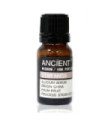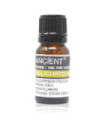Scientific Name: Cananga Odorata
Plant Part Used: Flowers
Origin: Comoros
Extraction Technique: Steam Distillation
The Ylang Ylang tree, which is native to eastern countries like Malaysia, Philippines, and Indonesia, is sizable and produces strongly fragrant yellow flowers with long, trailing petals. The abundant essential oil derived from these flowers is inexpensive but highly sought after in the perfume, cosmetics, and food industry due to its enticing aroma.
Scientifically, ylang-ylang essential oil is recognized as a mental stimulant. However, in aromatherapy, this oil is considered one of the most effective for calming both the mind and body. Its scent alone is believed to help decrease blood pressure. Adding the oil to a bath or using it in massage oil can enhance the relaxation experience. This oil is used to alleviate stress, depression, shock, or anxiety, and when used as a hair tonic, it can balance oil production. It should be noted that high concentrations of ylang ylang can lead to headaches or nausea.
In Malay, Ylang Ylang translates to 'flower of flowers' and has traditional connotations of being an aphrodisiac and a calming fragrance. In Indonesia, the flowers were scattered on the bed of newlyweds, and Muslim women would burn the oil to scent their harems. In China, the aroma was used to purify mandarin robes. Ylang Ylang essential oil has long been associated with perfumes and relaxation.






